Picture this: you've just stepped out of the shower, your hair dripping with water, longing for that perfect touch of softness and shine. But instead, you're greeted with a tangled mess that refuses to cooperate.
Sounds familiar, isn't it? Yep, we get it. If you're tired of battling with unruly hair, it's time to include a hair conditioner in your hair care routine.
Join us as we explore what a conditioner is, insider tips for finding a perfect formula and hair conditioner benefits of each type, and how often to use one.
What Is A Hair Conditioner?
A conditioner is a hair care product applied after shampooing to restore moisture, smoothness, and strength. Conditioners contain various ingredients like oils and butter that help to detangle hair, reduce frizz, and add shine.
There are different types of conditioners designed for specific hair needs. Rinse-out conditioners are the most common. Used after shampooing for daily care. Leave-in conditioners are left, providing longer-lasting moisture and protection.
Regular conditioners can prevent hair breakage, improve elasticity, and make hair easier to style. It's an essential part of a healthy hair care routine, especially for those with dry, damaged, or chemically treated hair.
How Frequently Should You Use a Hair Conditioner?
To answer this question: You must condition your hair every time you use a shampoo. But here is a guide for each hair type.
Normal Hair
Frequency: Use conditioner every time you shampoo, typically 2-3 times a week.
Purpose: Regular conditioning helps maintain the natural moisture balance, ensuring hair remains smooth, shiny, and manageable.
Type of Conditioner: A standard rinse-out conditioner is usually sufficient. Look for one that matches your hair type. Vilvah's Cream Conditioner is made with natural hair conditioners like tucuma butter and broccoli oil for deep conditioning and protection against hair breakage.
Dry or Damaged Hair
Frequency: Use conditioner every time you wash your hair, which may be daily or every other day, depending on how dry or damaged your hair is.
Purpose: Conditioner for dry hair helps replenish lost moisture, repair damage, and prevent further breakage. Dry or damaged hair benefits greatly from the added hydration and nutrients.
Type of Conditioner: Deep conditioners and goat milk hair masks are beneficial once a week to provide intensive treatment. These products contain higher concentrations of conditioning agents like oils, butter, and proteins.
Oily Hair
Frequency: Use a lightweight shampoo and conditioner focusing on the ends rather than the roots.
Purpose: While oily hair produces excess sebum, it still needs conditioning to prevent the ends from becoming dry and brittle. Conditioning the ends helps maintain a balanced moisture level.
Type of Conditioner: Opt for a light conditioner to avoid adding extra grease. Look for formulas that volumise and balance as these tend to be lighter and won't weigh down the hair.
Curly or Coarse Hair
Frequency: Use conditioner every time you wash your hair. Curly and coarse hair types tend to be drier because natural oils have a harder time travelling down the hair shaft.
Purpose: Conditioning helps define curls, reduce frizz, and keep hair soft and manageable. Leave-in conditioners can provide extra moisture and control throughout the day.
Type of Conditioner: Rich, creamy conditioners designed for curly or coarse hair work best. Products like goat milk are particularly beneficial to your hair. Additionally, deep conditioning treatments once a week can help maintain curl health and elasticity.
Additional Tips:
Scalp Care: Regardless of hair type, focus conditioner on the mid-lengths and ends of your hair. Applying too much to the scalp can lead to build-up and greasiness.
Product Build-up: Use a gentle shampoo to remove product build-up, ensuring your hair remains healthy and responsive to treatments. Hair care is genderless. So, a good hair conditioner for men is a must.
Individual Needs: Listen to your hair. If your hair feels dry, increase conditioning frequency or try more intensive treatments. If it feels weighed down, reduce the amount of conditioner or switch to a lighter formula.
In the pursuit of smooth hair, finding the perfect balance of conditioning is key. Remember, there's no one-size-fits-all answer to how often you should condition your hair.
For those with normal hair, a few times a week is just right, while dry or damaged locks may crave daily attention. Oily hair benefits from a light touch, focusing on the ends, while curly or coarse tresses thrive with regular conditioning and occasional deep treatments.
So, whether you're seeking silky smoothness, repairing past damage, or defining your natural curls, Vilvah's hair conditioner works magic. And with a little experimentation and TLC, you'll find the perfect fit for your hair's unique needs.


 Track Order
Track Order

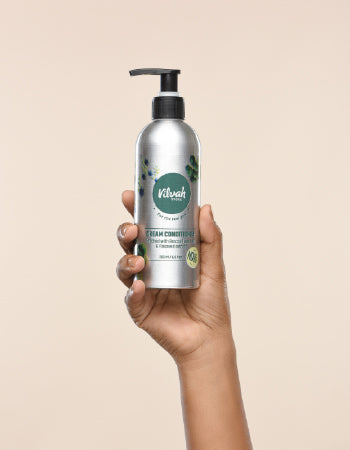





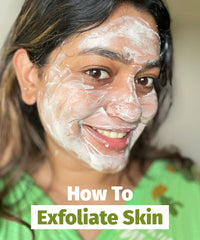

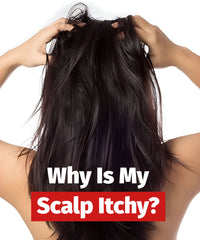
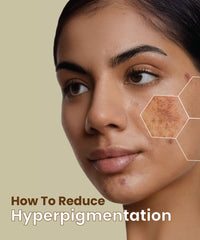
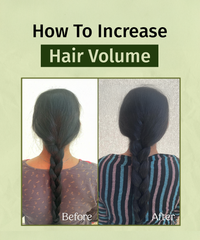
Leave a comment
All comments are moderated before being published.
This site is protected by hCaptcha and the hCaptcha Privacy Policy and Terms of Service apply.